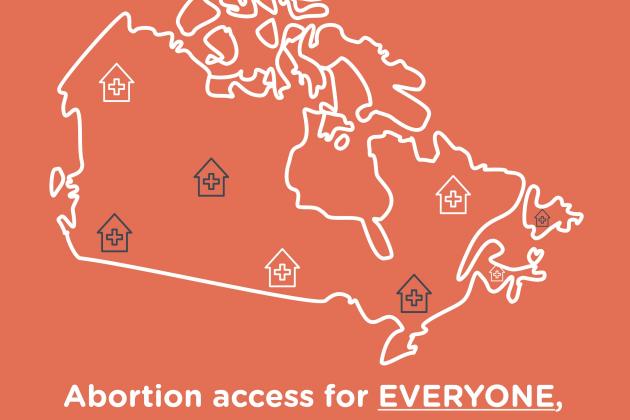
Abortion has been legal in Canada for 30 years, and yet it remains inaccessible throughout much of the country.
Access to abortion is STILL restricted by financial resources, geographic location, immigration status, and physicians refusing to provide the services on moral and religious grounds. Certain provinces and territories uphold unlawful regulations that limit access to abortion, even though the Government of Canada is OBLIGATED under the Canada Health Act to intervene where abortion is restricted.
In Canada, abortion is a very common procedure. Up to one in three women of reproductive age get an abortion in their lifetime. Most abortion providers are located less than 150 km from the US border and only 1 hospital in 6 offers abortion. Failing to ensure access is a human rights violation. (Norman, W. V. (2012). Induced abortion in Canada 1974-2005: Trends over the first generation with legal access. Contraception, 85, 185–1911Norman, W. V. (2012). Induced abortion in Canada 1974-2005: Trends over the first generation with legal access. Contraception, 85, 185–1911).
Many individuals seeking abortion services experience barriers due to:
- Medically unnecessarily rules and regulations at provincial and territorial levels, or within regional health systems and hospital settings;
- Lack of universal cost-coverage for medical abortion in Nunavut;
- In New Brunswick and Nova Scotia the provincial governments will not cover the cost of surgical abortion services outside of hospitals;
- This means that freestanding abortion clinics either cannot exist or must charge patients for services that should, by federal law be covered by Medicare.
- Having to travel large distances to access abortion, either within or across provincial lines;
- The unavailability of abortion services post-23 weeks throughout Canada, which means that people must travel to the US to find care when needing an abortion beyond that gestational time;
- Interference and intimidation from anti-choice organizations and activists, that will often mislead, obfuscate, and delay individuals seeking abortion care;
- Harassment, threats, violence, and intimidation from anti-choice protesters surrounding points of sexual health services;
- Lack of financial or logistical resources required to book and travel to an appointment to undergo a procedure;
- Unavailability of culturally safe and appropriate sexual health services for people who do not speak English or French or who are immigrants, refugees or members of minority cultures; and
- Lack of access to stigma-free sexual health services for people with addictions and other mental and physical health challenges.
Increasing access to medical abortion (Mifegymiso) offers an opportunity to address inequalities. It can be administered by different health care providers, including family doctors, midwives and nurses, which will necessarily increase access in more remote and rural areas, and within under serviced communities.
Canada must do more to stop anti-choice organizations and individuals from harassing, misleading, intimidating, and threatening people who seek and provide abortions. A small, vocal, and well-funded minority of people in Canada and around the world are dedicated to curtailing and violating those rights through the activities of anti-choice organizations. Many of these organizations actively interfere with people’s access to abortion care by, for example, sharing misleading information, gatekeeping or picketing abortion clinics or hospitals.
What Canada Can Do Right Now to Ensure Equal Access to Abortion:
- Withhold cash transfers to provinces and territories failing to ensure the availability and accessibility of abortion services.
- Publish accurate health information about abortion, and actively dispel false health information proliferated by anti-choice organizations.
- Establish a fully-funded national protocol for individuals seeking abortion services post-24 weeks outside of Canada.